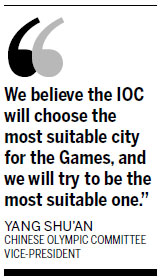

Beijing's 2022 Winter Games hopes challenged by rotation rules
Officials of Beijing's bidding committee for the 2022 Winter Olympic Games admitted air pollution is a hurdle to a successful bid but vowed to clear up the problem in time.
"The air pollution really is a challenge for Beijing's bid, but it was also a question before the 2008 Olympics," Yang Shu'an, vice-president of the Beijing 2022 Olympic Winter Games Bid Committee and vice-president of the Chinese Olympic Committee, said on the sidelines of the ongoing Sochi Winter Olympic Games.
|
Switzerland's Lucien Koch competes in the Men's Snowboard Slopestyle Semifinals at the Rosa Khutor Extreme Park during the Sochi Winter Olympics on Saturday. Franck Fife / AFP |
"Compared with that time, the government is now more determined to solve the problem. So, we are confident in this respect," Yang told China Daily.
Last November, Beijing announced a plan to jointly bid to host the 2022 Winter Olympic Games with Zhangjiakou of Hebei province, 200 kilometers northwest of Beijing.
The biggest challenge for Beijing may not be the increasing number of snow-free days but the regular bouts of smog in recent years.
Municipal officials said bidding for the 2022 Games will boost pollution control.
"Last year, Beijing had set a goal to reduce pollution by 25 percent by 2017," said Beijing's deputy mayor Yang Xiaochao, who is also the bidding committee's vice-president.
In 2013, the average PM2.5 reading in Beijing was 89.5 micrograms per cubic meter - more than double the national standard. The goal is to reduce that to an average of 60 micrograms per cubic meter by 2017, as the city's legislature passed a high-profile Air Pollution Prevention Regulation at the end of its people's congress' plenary session last month.
The PM2.5 index measures airborne particles smaller than 2.5 micrometers in diameter, which are associated with health risks.

Beijing must compete with other bidders - Norway's Oslo, Ukraine's Lviv, Kazakhstan's Almaty and a joint effort from Poland and Slovakia.
Yang Xiaochao said that, if Beijing wins the bid, it will use current venues to the extent possible. Only three of the city's 12 competition venues will be newly built.
"Our overall idea is to have the competition and non-competition venues located along a line extending from Beijing to Yanqing and then Zhangjiakou, forming three relatively compact venue clusters," he said.
According to the plan, five ice sports will take place at the MasterCard Center in western downtown Beijing, where the basketball competitions were staged during the 2008 Games. The opening and closing ceremonies will be staged in the National Stadium, also known as the Bird's Nest.
The second venue cluster will be located in Yanqing county's Xiaohaituo Mountain area, about 90 kilometers northwest of central Beijing. Temporary venues will be built for such sports as bobsleigh, luge, skeleton and alpine skiing.
Other skiing sports will be held in Zhangjiakou's Chongli county, about 220 km from central Beijing and 130 km from Xiaohaituo Mountain.

An intercity railway has been planned to connect the national capital and Zhangjiakou. It will only take about 40 minutes to travel between the cities after the railway becomes operational.
As the Games' hosting rights rotate among different continents, it will not be easy for Beijing to win the 2022 Games. The 2018 Winter Games will be in the Republic of Korea's Pyeongchang, and the 2020 Summer Games will be in Tokyo, Japan.
But Chinese officials have said they would rather prepare well first.
"We believe the IOC will choose the most suitable city for the Games, and we will try to be the most suitable one," Yang Shu'an said.
The Sochi Winter Olympic Games opened on Friday. Chinese President Xi Jinping attended the opening ceremony at the invitation of his Russian counterpart, Vladimir Putin.
Putin declared the Games open at the Fisht Olympic Stadium, following a speech by Olympic chief Thomas Bach, who stressed, "the Olympics are about building bridges to bring people together".
China sent a 139-member delegation, including 66 athletes, to Russia's first-ever winter Olympics. The Chinese athletes will compete in alpine skiing, freestyle skiing, cross-country skiing, biathlon, speed skating, short track speed skating, figure skating, snowboarding and curling.
leilei@chinadaily.com.cn